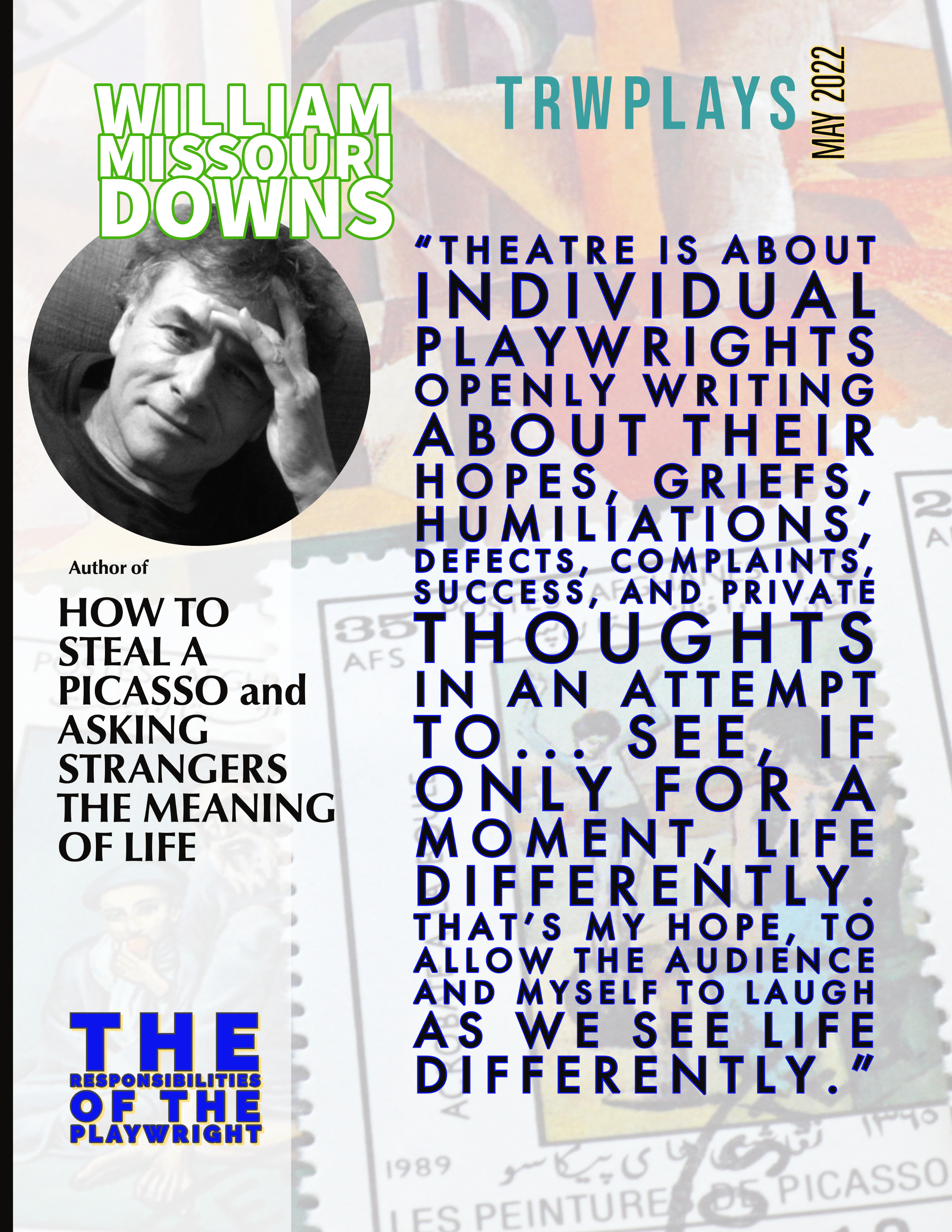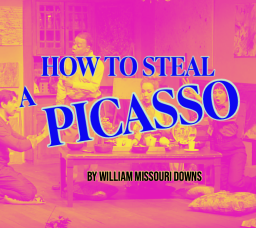
William Missouri Downs talks plays, writing and...why Death of a Salesman may need a rewrite.
by Katie Stottlemire

The playwright of HOW TO STEAL A PICASSO & ASKING STRANGERS THE MEANING OF LIFE gets to the art of the matter with TRWPlays QnA series, with a focus on the responsibilities of the playwright.
“Theatre is about individual playwrights openly writing about their hopes, griefs, humiliations, defects, complaints, success, and private thoughts in an attempt to... see, if only for a moment, life differently. That’s my hope, to allow the audience and myself to laugh as we see life differently.”
KATIE STOTTLEMIRE: Two of your plays have found a home at TRW: HOW TO STEAL A PICASSO and the newly released ASKING STRANGERS THE MEANING OF LIFE. Both are hilarious pieces that take very different formats. HOW TO STEAL A PICASSO is set in the tangible household of the family the story centers on and happens in real time, whereas ASKING STRANGERS is fluid with time and takes place in multiple, ambiguous locations. How do you approach writing comedy in such a variety of contexts and settings?
WILLIAM MISSOURI DOWNS: I believe that every context, setting, and story can be a comedy. I read once that the Greeks believed comedy, not tragedy, was the true catharsis. If you think about it, wouldn’t Oedipus make a much better comedy? In the final scene, Oedipus and his mom would file for a no-fault divorce, provide for their hemophilic-Habsburg jaw sons, and learn to laugh about their very human mistake - And then they’d have make up sex. And while I’m at, Death of a Salesman would also make a better comedy. Just before curtain, there’d be a touching scene where Willy apologizes to his sons for giving them such stupid names. Biff and Happy? He must’ve known that such handles would scar them. And then he’d talk about how there’s more to life than trying to live up to the unachievable American dream - Like enjoying the afternoon with his newly named sons, Ethan and Owen.
KATIE: At that point, the play would probably need a new name too! Both of your plays offer catharsis through comedy while interrogating essential questions about humanity. HOW TO STEAL A PICASSO explores what constitutes art and ASKING STRANGERS questions the very meaning of our existence. What are you hoping to inspire by asking these questions through your work?
WILLIAM: Theatre is about individual playwrights openly writing about their hopes, griefs, humiliations, defects, complaints, success, and private thoughts in an attempt to find that cathartic, transformative moment where an audience steps away from algorithm-generated well-charted territory and sees, if only for a moment, life differently. That’s my hope, to allow the audience and myself to laugh as we see life differently.
KATIE: Speaking of seeing life differently, in ASKING STRANGERS, one of the characters makes a claim that is likely to stick with many readers and audience members: that all stories are made for children. Is this a view you share? Who do you think stories are written for?
WILLIAM: I think stories give us structure. Our need for structure is really the need to simplify, to clear away the irrelevant, in order to create or find meaning in our lives. We need simplified structures because the excessive and random complexity of the world exceeds our cognitive capacities. Religion, philosophy, science, art, theatre, and comedy streamline life. And so, in a sense, all plays, novels, short stories, and poems take the complexity of life down to our level.

KATIE: On that note, let’s take the complexities of the craft of writing to your level. Both pieces encourage an examination and questioning of the ownership of art and the responsibility of artists and storytellers. What do you consider to be the responsibilities of a playwright?
WILLIAM: Philosopher Ludwig Wittgenstein said our society suffers from a “philosophical illness.” A diet of only one philosophy, political ideology, or way of seeing the world leads to “dietary insufficiency.”
The writer Nadine Gordimer said, “A writer is committed to trying to make sense of life. It's a search. So there is that commitment first of all: the commitment to the honesty and determination to go as deeply into things as possible, and to dredge up what little bit of truth you with your talent can then express."
The philosopher Allan Bloom wrote “Freedom of the mind requires not only, or not even especially, the absence of legal constraints but the presence of alternative thoughts. The most successful tyranny is not the one that uses force to assure uniformity, but the one that removes awareness of other possibilities.”
Maria Tatar wrote in The Heroine with 1001 Faces that need,” to recognize that no single protagonist has a hotline to the truth, and to understand how justice is a hard-won social good that requires us to listen to more than one voice and to be open to listening both to individual testimony and to choruses of lamentation and complaint.”
Pacifist, anarchist, and social critic Paul Goodman wrote that art, “is reacting with one’s ideal to the flaw in oneself and in the world, and somehow making that reaction formation solid enough in the medium so that it indeed becomes an improved bit of real world for others.”
Writer Chimamanda Ngozi Adichie wrote, “Stories have been used to dispossess and to malign. But stories can also be used to empower, and to humanize. Stories can break the dignity of a people. But stories can also repair that broken dignity.”
Playwright John Arden said, “Theater must celebrate noise, disorder, drunkenness, lasciviousness, nudity, generosity, corruption, fertility, and ease.”
Playwright Marsh Norman said, “Playwriting is a physical craft, and it's a thing that requires muscle, intellectual and emotional. People who are afraid of that, people who are afraid of doing damage--those are the people who'll never make it. You have to be willing to be a killer.”
In his play The Real Thing, Tom Stoppard says, "I don't think writers are sacred, but words are. They deserve respect. If you get the right ones in the right order, you can nudge the world a little..."
The novelist, short story writer Robert Coover said, "The narrative impulse is always with us; we couldn't imagine ourselves through a day without it. ... We need myths to get by. We need story; otherwise the tremendous randomness of experience overwhelms us. Story is what penetrates."
Critic Robert Brustein said, “The channels that support serious advanced expression are quickly drying up. The big cultural dinosaurs will probably survive… if they fill their schedules with the equivalent of crowd-pleasing holiday shows like A Christmas Carol and Nutcracker, but high art in America is dying and dying along with it are our hopes for a still significant civilization.”